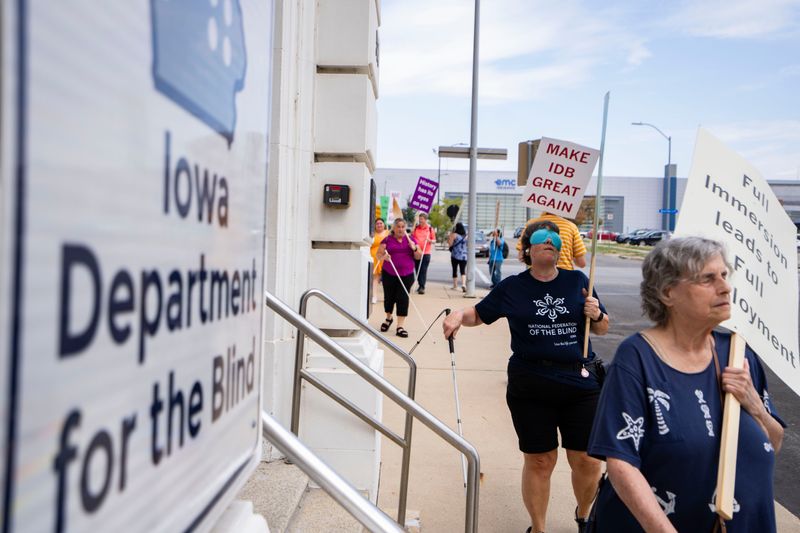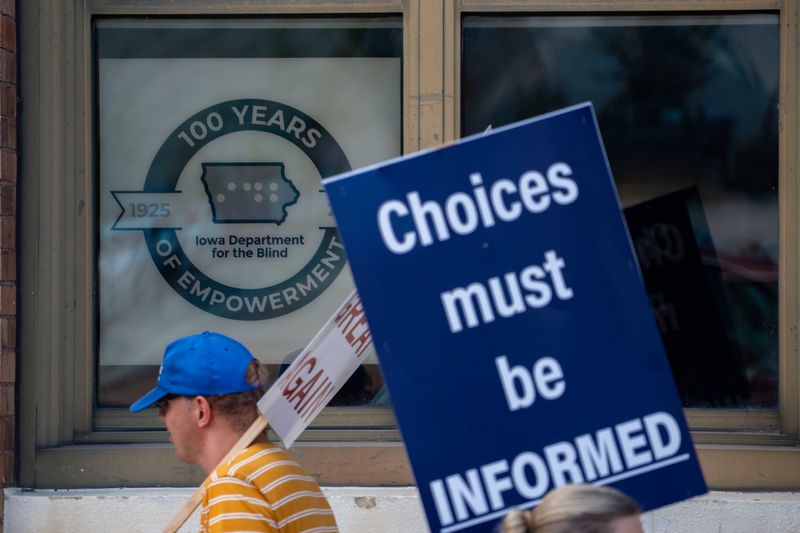“Respect the people, respect the past, build a future that will last,” protesters chanted outside the Iowa Department for the Blind building in opposition to changes to Iowa’s blindness training.
The National Federation of the Blind of Iowa held a protest that drew about 30 people on Tuesday, Sept. 16, outside the Iowa Department for the Blind’s downtown Des Moines office over policy changes under new leadership.

Director Stacy Cervenka assumed the agency’s top role July 7 after Gov. Kim Reynolds appointed her in May. The Iowa Commission for the Blind, which sets the agency’s policy, appointed directors before lawmakers passed the governor’s plan to streamline state government in 2023 and made the department head a gubernatorial appointee.
The commission on Sept. 12 approved an update to the Orientation Center for the Blind Student Handbook regarding the use of learning shades, commonly known as “sleepshades,” which are specialized blindfolds used for teaching skills to blind people. The change tweaked policy language from “required” to “highly recommended,” in essence making the shades optional.
The department pioneered the model in the 1960s that required students to train with learning shades — allowing students to build reliable nonvisual skills, teaching them how to use canes or their other senses, such as sound.
Helen Mejia, president of the National Federation of the Blind of Iowa, said her group maintains that people who are newly losing their vision and may be scared don’t yet know enough to make the choice to use learning shades.
“Staff members would talk with clients, show them by role modeling themselves how they could do things without vision and show them the benefits to help them decide whether or not the program was right for them, instead of not having those conversations,” Mejia said.
Connie Mendenhall, the agency’s chief information officer, said in a statement that recent survey data show 35% of department consumers would be more likely to attend the Orientation Center if sleepshades were recommended instead of required.
She said the new policy aligns with best practices promoted by the Association for Education and Rehabilitation of the Blind and Visually Impaired that encourage individualized instruction.
“This change gives Iowans who are blind or have low vision greater choice in their training and better serves individuals with additional disabilities and health conditions, for whom sleepshades aren’t always a safe, effective, or viable option,” Mendenhall said. “Sleepshades remain an important tool for learning non-visual techniques, but their use is now based on individual needs rather than a blanket requirement.”
Organization calls for new director, more research before programmatic changes
Holding signs that read “Make IDB Great Again,” “choices must be informed” and “turn around IDB,” protesters asked the department to respect the legacy of the 100-year-old Iowa Department for the Blind and its historic Iowa Empowerment and Independence Center.
Mejia said her organization is calling for a new director and asks that the department conduct research and gather input before making any programmatic changes.
“The philosophy, the approach of the agency matters for that because this is the only agency in Iowathat provides these services,” Mejia said. “And so when a new director comes in, we recognize that looking at what’s working well, considering changes is a good thing to do. The problem is, instead ofjust bringing ideas in from out of state and implementing them right away, you need to actuallytake the time and see what is needed by the people that you are serving.”
Jonathan Rice, of Cedar Rapids, said he went through the center’s training in 1996 and he worked there until 2013.
Rice said he is blind but has had a “fair amount” of usable vision his entire life, and would not have been as effective of a rehabilitation counselor without training with the sleep shades. The shades helped him demonstrate to students how to navigate situations without vision.
By making sleep shades optional, he said many blind people who have some usable vision may forego that training method and be less confident in living independently.
“If I were allowed to use that vision, a person who has some vision is going to just automatically use it,” Rice said. “And there’s always a question in the mind here: Did I do it because I knew how to do the blindness techniques, or was I just using my vision to accomplish it? And the tendency is to think, ‘Ican’t do it without that little vision I have.’ With the sleep shade requirement, I learned that Icould get up, get around all over Minneapolis, all over Des Moines with my cane without seeinga thing.”
Policy changes ensure ‘equitable access’ to training, department says
Mendenhall said dropping the learning shades requirement was intended to “ensure equitable access to vocational rehabilitation and independent living training.”
When informed of the learning shades requirement, Mendenhall said, many consumers choose not to pursue Center-based training and instead rely on limited in-home instruction. The Center offers 40 hours of instruction a week, compared with typically two hours of instruction every two weeks with in-home training. At that pace, it would take about 40 weeks to equal one week of Center-based training.
She said allowing consumers to choose whether to use sleepshades reduces barriers and expands opportunities for Iowans who are blind or have low vision.
“The goal of this policy change is to expand the number of blind and low-vision Iowans the Department can serve and support — helping them stay in the workforce, attend college, find meaningful employment, and live the full, independent lives every Iowa citizen deserves,” Mendenhall said.
Reiterating the need for department leadership to gather input from staff and clients, Mejia said: “The key thing for us is that the state agency serving blind people really pays attention to the needs of Iowans, so that our tax dollars are used to effectively help people become employed, live in their homes and be the best for the state of Iowa.”
Marissa Payne covers the Iowa Statehouse and politics for the Register. Reach her by email at mjpayne@registermedia.com. Follow her on X, formerly known as Twitter, at @marissajpayne.
This article originally appeared on Des Moines Register: Protesters oppose Iowa Department for the Blind’s changes to state’s blindness training
Reporting by Marissa Payne, Des Moines Register / Des Moines Register
USA TODAY Network via Reuters Connect





